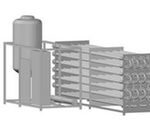Products with a lower PH (less than 4.6) don´t need such high temperatures to reach sterilization, as those products with a high PH, such as milk. The reason for this is that the micro organisms present in lower PH products are easier to destroy by applying heat.
MachinePoint supplies various different types of pasteurizers and heat exchangers for both liquids and solids, which both need different technologies.
Corrugated tube heat exchanger or Tubular Pasteurizers with corrugated pipes
These pasteurizers have a special structure: a jacket multitubular heat exchange which increases the surface for thermal exchange.
They are very good at pasteurizing liquids which contain small pieces and fibers; such as fruit juices with viscosity of up to 500 cps.
De aerators, homogenizers, product recovery systems, flavor injection systems, oil distillation (for oranges), etc; any of these systems can be added to the tubular exchanger on request.
Mono Tube heat exchangers
These heat exchangers vary from the ones above in that they only have one heat exchanger per unit.
They are used to process liquids that contain bigger pieces, such as orange pulp marmalades, peach cubes, strawberries, mango, onion cubes, paprika pieces, etc.
We use piston pumps to pump the products through the system without them suffering any deterioration.
Annular tube heat exchangers
These heat exchangers are used for the pasteurization of products with high viscosity (higher than 2000 cps), where the product to be treated needs to be heated and cooled controlling the pressures.
They consist of a triple tube heat exchanger, where the product flows through the inner tube and the heat source in the tubes around it.
Concentrated tomato at 30 brix is treated with this type of heat exchangers for example, where working pressure reaches 200 bar.
Annular tube heat exchangers substitute the traditional dynamic scraped surface heat exchangers, because maintenance is easier as they are static. For tomato processing for example where production is concentrated around a few months a year, this annular heat exchangers have the advantage that can work continuously.
We use piston pumps, with ceramic seals when abrasive products.
Ohmic heating treatments, electrical resistance heating, Joule heating, or electro-heating
Ohmic heating is an advanced thermal processing method for pasteurizing food. Food serves as an electrical resistor, and it is heated by passing electricity through it. Electrical energy is dissipated into heat, which results in rapid and uniform heating.
MachinePoint supplies two types of ohmic heating systems.
For products with high pieces, such as whole strawberries, peaches or tomatoes. This technology allows reaching a very good quality pasteurized product.
For processing of orange juice. Again as the juice is only exposed to a high temperature for a very short time, it maintains nearly its fresh qualities untouched (flavour, vitamins, texture, smells, etc). The processing of orange juice using ohmic technologies is the only way to reach nowadays a pasteurized orange juice with qualities equivalent to the fresh squeezed orange juice.
Plate heat exchanger
MachinePoint supplies plate heat exchangers for liquids without big pieces. They will provide you with the same results and tubular heat exchangers but they are cheaper.
Our plate heat exchangers are a great option for the production of beverages, juices without fibers, pasteurized milk, etc.
They are composed of multiple, thin plates with large surface areas.
De aerator, homogenizers, product recovery systems, flavor injection systems, oil distillation (for oranges), etc; all of these systems can be added to the tubular exchanger on request.
Pasteurization equipment: Operation, durability, and second-hand market
Pasteurization equipment plays a crucial role in preserving the properties of food by eliminating unwanted microorganisms, such as bacteria and yeasts, that can cause spoilage or diseases. This helps extend the shelf life of food and maintain its quality.
The pasteurization process can affect the flavor of foods. In some cases, it can minimize the presence of microorganisms that contribute to spoilage and unpleasant flavors. However, in other cases, the heat applied during pasteurization can slightly alter the flavor of foods, although efforts are usually made to minimize this effect.
Yes, by eliminating microorganisms and reducing bacterial load, pasteurization helps prevent spoilage and maintain food quality over an extended period, making it more durable and safer for consumption.
Pasteurization equipment works by applying controlled heat through a specific heating and cooling process. This process eliminates unwanted microorganisms present in liquid foods while preserving their nutritional and organoleptic properties.
Yes, at MachinePoint, we offer a variety of top-quality second-hand pasteurizers for sale. These machines can be a cost-effective option for those seeking to acquire quality machinery for food production while reducing costs.





